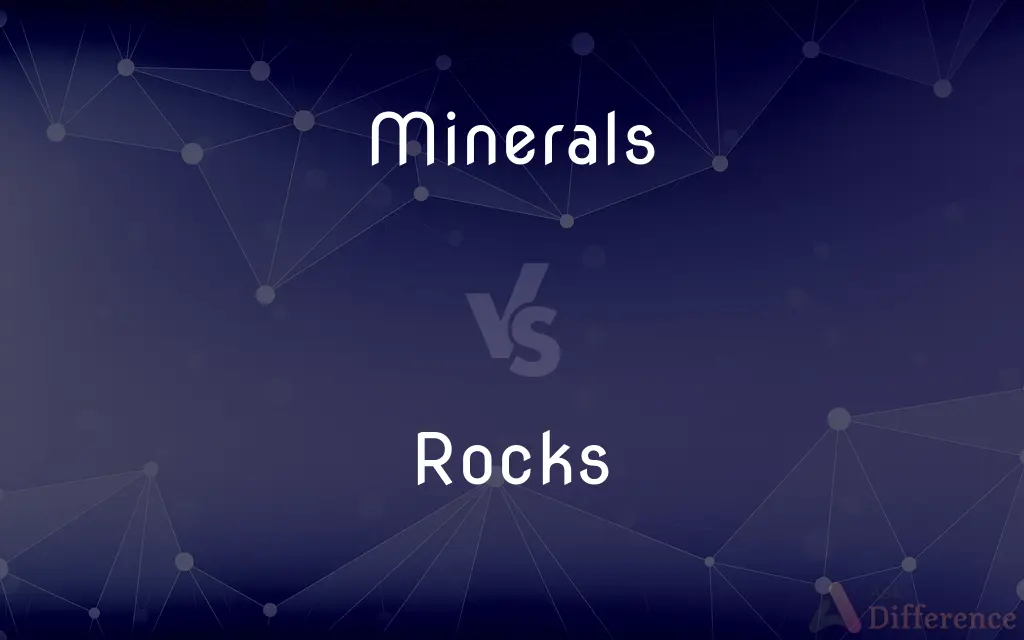Minerals vs. Rocks — What's the Difference?
Edited by Tayyaba Rehman — By Fiza Rafique — Published on November 14, 2023
Minerals are naturally occurring, inorganic solids with a specific chemical composition, while rocks are aggregates of one or more minerals.

Difference Between Minerals and Rocks
Table of Contents
ADVERTISEMENT
Key Differences
Minerals are defined as naturally occurring, inorganic substances that have a definitive chemical structure. On the other hand, rocks are combinations of different minerals or mineraloids. Both have unique properties that set them apart, with minerals usually having specific crystalline structures.
Minerals possess a characteristic chemical composition and physical properties, such as hardness and cleavage. Rocks, however, can be made up of a mix of different minerals, each contributing to the rock's overall characteristics. In this manner, rocks derive their properties from the minerals they contain.
Minerals can be found in a pure state or as a part of various rocks. Rocks, in contrast, are the solid, cohesive structures that can consist of one or multiple minerals. For instance, granite is a rock composed mainly of the minerals quartz, feldspar, and mica.
Studying minerals gives insights into their individual properties and formations. Studying rocks provides information about Earth's history and the processes that have shaped it, as rocks often form from the consolidation of minerals over time.
While there are thousands of known minerals, there are fewer rock types. This is because rocks categorize based on their formation process and composition, which often includes a combination of several minerals.
ADVERTISEMENT
Comparison Chart
Basic Definition
Naturally occurring, inorganic solids.
Aggregates of one or more minerals.
Composition
Specific chemical composition.
Varied, consists of multiple minerals.
Form
Can be found in pure form.
Always composed of combinations of minerals.
Number of Types
Thousands of distinct minerals.
Fewer types, categorized by formation and composition.
Study Importance
Provides insight into individual properties and formations.
Offers knowledge about Earth's history and geologic processes.
Compare with Definitions
Minerals
They have a distinct crystalline structure.
The unique hexagonal structure of a quartz mineral distinguishes it from other minerals.
Rocks
Formed through geological processes.
Sedimentary rocks, like limestone, form from the accumulation of sediments over time.
Minerals
They are not derived from living organisms.
Unlike coal, which originates from plant remains, minerals like gold form from inorganic processes.
Rocks
Can consist of both minerals and mineraloids.
Obsidian, a type of rock, is primarily composed of mineraloids, lacking a crystalline structure.
Minerals
Naturally occurring, inorganic substances with a specific chemical structure.
Quartz and feldspar are two common minerals found in the Earth's crust.
Rocks
Aggregates or combinations of one or more minerals.
Granite is a rock composed of quartz, feldspar, and mica minerals.
Minerals
Defined by specific physical properties such as hardness and cleavage.
The softness of talc, a mineral, allows it to be easily scratched with a fingernail.
Rocks
Relatively hard, naturally formed mineral or petrified matter; stone.
Minerals
Found either in a pure state or as part of rocks.
While diamonds are minerals found in pure form, they can also be embedded within rocks.
Rocks
A relatively small piece or fragment of such material.
Minerals
A naturally occurring, homogeneous inorganic solid substance having a definite chemical composition and characteristic crystalline structure, color, and hardness.
Rocks
A relatively large body of such material, as a cliff or peak.
Minerals
An element, such as gold or silver.
Rocks
A naturally formed aggregate of mineral matter constituting a significant part of the earth's crust.
Minerals
An organic derivative, such as coal or petroleum.
Rocks
One that is similar to or suggestive of a mass of stone in stability, firmness, or dependability
The family has been his rock during this difficult time.
Minerals
A substance, such as stone, sand, salt, or coal, that is extracted or obtained from the ground or water and used in economic activities.
Rocks
Rocks(Slang) Money.
Minerals
A substance that is neither animal nor vegetable; inorganic matter.
Rocks
(Slang) A large gem, especially a diamond.
Minerals
An inorganic element, such as calcium, iron, potassium, sodium, or zinc, that is essential to the nutrition of humans, animals, and plants.
Rocks
(Slang) Crack cocaine.
Minerals
An ore.
Rocks
A varicolored stick candy.
Minerals
Minerals Mineral water.
Rocks
Rock candy.
Minerals
A soft drink.
Rocks
A rocking motion.
Minerals
Of or relating to minerals
A mineral deposit.
Rocks
The act of rocking.
Minerals
Impregnated with minerals.
Rocks
(Music) A form of popular music characterized by electronically amplified instrumentation, a heavily accented beat, and relatively simple phrase structure. Originating in the United States in the 1950s, rock incorporates a variety of musical styles, especially rhythm and blues, country music, and gospel. Also called rock-and-roll, rock 'n' roll.
Minerals
Plural of mineral
Rocks
To move back and forth or from side to side, especially gently or rhythmically.
Rocks
To sway violently, as from a blow or shock.
Rocks
To be washed and panned in a cradle or in a rocker. Used of ores.
Rocks
(Music) To play or dance to rock music.
Rocks
(Slang) To be excellent or outstanding. Used in exclamations of approval.
Rocks
To move (a child, for example) back and forth or from side to side, especially in order to soothe or lull to sleep.
Rocks
To cause to shake or sway violently.
Rocks
To disturb the mental or emotional equilibrium of; upset
News of the scandal rocked the town.
Rocks
To excite or cause strong feeling in, as by playing rock music.
Rocks
To wash or pan (ore) in a cradle or rocker.
Rocks
In mezzotint engraving, to roughen (a metal plate) with a rocker or roulette.
Rocks
(Slang) To exhibit, display, or use with flair
The actor rocked a pair of diamond-studded sunglasses at the movie premiere.
Rocks
Plural of rock
Rocks
(slang) Money.
Rocks
Testicles.
Rocks
(slang) Crack cocaine.
You seem a bit out of it lately, have you been smoking rocks again?
Rocks
Classified based on their formation process.
Igneous rocks, such as basalt, are formed from the solidification of molten magma.
Rocks
Cover the Earth's surface and have varied compositions.
The Rocky Mountains are made up of a variety of rock types, each with different mineral compositions.
Common Curiosities
Can a rock be made up of a single mineral?
Yes, some rocks like limestone can be almost entirely composed of a single mineral.
How many types of minerals are there?
There are thousands of distinct minerals identified on Earth.
How are rocks different from minerals?
Rocks are aggregates or combinations of one or more minerals.
Are minerals always hard substances?
No, minerals vary in hardness; for example, talc is very soft, while diamond is the hardest known mineral.
What are minerals?
Minerals are naturally occurring, inorganic solids with a specific chemical composition and crystalline structure.
What is a common example of a rock?
Granite is a common example of a rock, composed mainly of quartz, feldspar, and mica minerals.
Share Your Discovery

Previous Comparison
Old English vs. Middle English
Next Comparison
Coyote Howl vs. Wolf HowlAuthor Spotlight
Written by
Fiza RafiqueFiza Rafique is a skilled content writer at AskDifference.com, where she meticulously refines and enhances written pieces. Drawing from her vast editorial expertise, Fiza ensures clarity, accuracy, and precision in every article. Passionate about language, she continually seeks to elevate the quality of content for readers worldwide.
Edited by
Tayyaba RehmanTayyaba Rehman is a distinguished writer, currently serving as a primary contributor to askdifference.com. As a researcher in semantics and etymology, Tayyaba's passion for the complexity of languages and their distinctions has found a perfect home on the platform. Tayyaba delves into the intricacies of language, distinguishing between commonly confused words and phrases, thereby providing clarity for readers worldwide.
















































